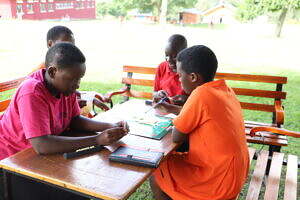At Mental Health Uganda (MHU), we are committed to enhancing the mental well-being of young people across the country. One of our standout initiatives, the Youth Mental Health Project, is making significant strides in creating safe spaces within schools. These spaces are more than just physical locations; they are vital sanctuaries where students can find solace, support, and understanding. Funded by Operation Days Work (ODW) and in partnership with SOS Children’s Villages Uganda, this project is a beacon of hope for many students.
Understanding the Need for Safe Spaces
In Uganda, mental health is often misunderstood and stigmatized, which creates barriers for those seeking help. Consequently, the Youth Mental Health Project aims to break these barriers by normalizing mental health conversations and providing accessible psychosocial support in schools. A core component of this initiative is the establishment of safe spaces.
What Are Safe Spaces?
Safe spaces are dedicated areas within schools where students can relax, meditate, play, and discuss their mental health challenges freely. These spaces are equipped with:
- Mental Health Literature: Books and pamphlets that provide valuable information on mental health topics, coping strategies, and stories of resilience.
- Board Games: Interactive games that encourage social interaction, teamwork, and stress relief.
- Relaxation Zones: Comfortable seating and calming decor that promote relaxation and mindfulness.
- IEC Materials: Information, Education, and Communication (IEC) materials that raise awareness and educate students about mental health issues.


The Role of Safe Spaces in Mental Health
- Promoting Mental Health Awareness
To begin with, safe spaces serve as hubs for mental health education. The availability of mental health literature and IEC materials helps demystify mental health issues and provides students with the knowledge they need to understand their own mental health and that of their peers.
- Encouraging Open Conversations
Moreover, by creating an environment where students feel safe and supported, safe spaces encourage open conversations about mental health. This, in turn, helps to reduce the stigma associated with mental health issues and fosters a culture of acceptance and understanding.
- Providing Emotional Support
In addition, safe spaces offer a refuge for students experiencing stress, anxiety, or other mental health challenges. The presence of board games and relaxation zones provides students with healthy outlets for stress relief and emotional support.
- Building Resilience and Coping Skills
Through activities and interactions within safe spaces, students can build resilience and develop coping skills. These skills are crucial for navigating the challenges of adolescence and promoting long-term mental well-being.
Success Stories: Impact of Safe Spaces
Since the inception of the Youth Mental Health Project, safe spaces have had a profound impact on the students in Gulu and Wakiso districts. Here are a few success stories:
- Increased Engagement: To date, over 10,000 students, teachers, and school administrators have participated in mental health awareness campaigns and activities within safe spaces.
- Enhanced Support Networks: Additionally, students have reported feeling more supported and less isolated, thanks to the peer interactions and support networks fostered within safe spaces.
- Improved Mental Health Outcomes: Many students have experienced a reduction in symptoms of stress and anxiety, and an overall improvement in their mental health and well-being.
The Path Forward
Looking ahead, the success of the Youth Mental Health Project underscores the importance of safe spaces in schools. As we continue to expand this initiative, we are committed to:
- Increasing the Number of Safe Spaces: We aim to establish safe spaces in more schools across Uganda, reaching even more students.
- Enhancing Resources and Activities: Furthermore, we will continue to enrich safe spaces with additional resources, activities, and support services.
- Fostering Community Engagement: We will work closely with communities, parents, and stakeholders to promote the importance of mental health and support the sustainability of safe spaces.
Join Us in Making a Difference
At Mental Health Uganda, we believe that every student deserves a safe and supportive environment to thrive. Safe spaces are a crucial step towards achieving this goal. We extend our heartfelt thanks to our partner, SOS Children’s Villages Uganda, and our donor, Operation Days Work (ODW), for their unwavering support. We invite you to join us in this vital mission. Together, we can create a future where mental health is openly discussed, understood, and supported.
Speak up, be kind! If you know someone struggling, link them to our free professional counseling service via our toll-free number: 0800 21 21 21, available Mon-Fri 8:30 am to 5:00 pm. Read more about The Youth Mental Health Project here: https://bit.ly/3MIT9ZG

